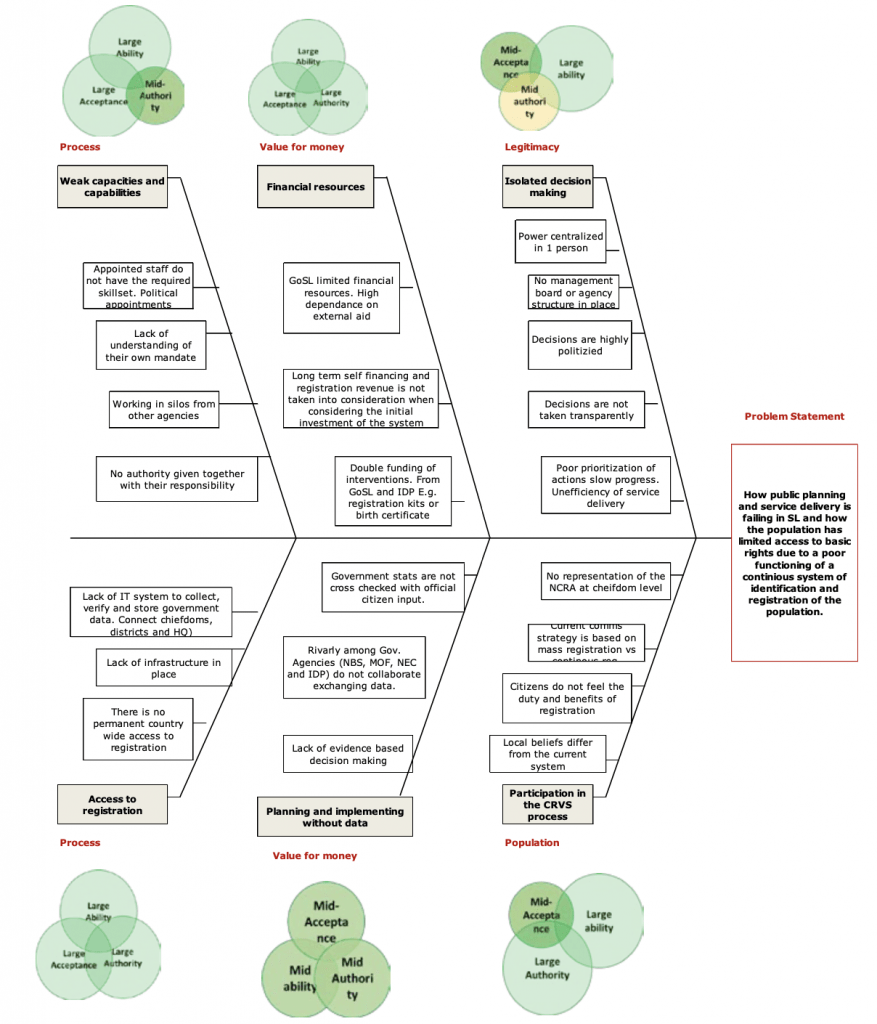Guest blog written by Laura Michelle Delgado Van Demen
A year after the COVID-19 pandemic started, the perception that our team working on the establishment of a Civil Registration and Vital Statistics (CRVS) system in Sierra Leone, was standing alone in front of a very massive reform had increased. We were very frustrated since each time we were taking a step forward it seemed we were also taking two backwards. Authorisation was not there neither a spirit for reform and collaboration with different agents through this European Union funded project.
I have been working for five years in the field of EU development and external aid and one thing is clear to me: the system, collaboration and approach to building capacities needs to be done differently. It was in 2019 when I heard PDIA for the first time from a very inspiring PFM practitioner when discussing on alternatives and approaches for the projects we were implementing. Thus, building on frustration and trying to find a new way of doing things, I joined the Implementing Public Policy at HKS with the hope of regaining hope again.
The course gained different levels of intensity throughout the 22 weeks; it was always dynamic, engaging and very inspiring and exceeded my expectations.
During the course, my problem statement evolved and PDIA helped refocus me on what really mattered. Here are some key takeaways of these last months of applying new tools to the establishment of a functioning civil registration system in Sierra Leone.
To manage the unknown and limit your assumptions is key. Assuming we know more than we actually did, focusing on the solution instead on the actual problem and not understanding how authorisation levels practically work were habits that were leading us fail. IPP taught us how to go beyond classing plan and control measures for implementation, manage the unknown, break a problem down as many times as necessary until you are at the core and then rebuild it.
Understand your Triple A! This was one of my favourite exercises in the course. To measure the Ability, Acceptance and Authority of the different causes of the problem helps you find the correct entry points, iterate and plan. In our case, it helped us to focus more on two entry points: the legitimacy and legal act around the system, since we had already the technical ability, acceptance and a mid- authority that was worked through quite quickly, as well as building capacities around reporting and project design which was necessary to ensure donor funding. (See fishbone below)
Fishbone Diagram – Civil Registration in Sierra Leone

4P Leadership framework. Leadership is non –heroic and must be based on purpose. Rob Wilkinson 4P really helped to open the discussion with other actors that also cared about the problem but were not involved from an active listening perspective. It was particularly interesting to see how we and others frame the same problem, and how to manage disappointment and progress at a rate that it’s absorbable for the agents involved. In our project, we realise now how we made many mistakes on how we managed the absorption rate and will definitely take Dr. Wilkinson’s recommendations for the future.
We cannot do this alone, as it’s well explained throughout the 4P Model, heroes do not stand alone. Reforms are not accomplished by one individual but by a set of agents that share purpose, trust and authority. PDIA is a unique methodology that can be applied to all sort of complex professional (and even personal) problems, it is not over complicated. It is flexible and triggers learning from failures and manage success.
My last and very valuable (personal and professional) take away was about team building, delegation and sharing authority. Six months ago, I felt as though all the responsibility for the success or failure of the project was on my hands, even if not necessarily the authorisation was and even if there were more people involved. I am now writing this blog after a few weeks of sick leave for burn out, which is definitely not a success and has slowed me down for implementation but I take many lessons from it as well. We are not heroes, and we cannot save the day in isolation but perhaps PDIA and principles such as multi agent led reforms, active listening, humbleness, mapping delegation will. In addition, most likely, I might fail again, but we will learn from it differently and adapt.
I would like to thank my classmates and particularly my peer group, Alfonso, Collin, Julio and Kim for sharing your problems, experiences and being so understanding. I hope we get to cross paths again and wish you all the best to continue with the amazing work you do. Special thank you to Salimah, Professor Andrews, Professor Wilkinson, Amber, Alison and Dana at Harvard: I cannot express enough how your guidance, experiences and professionalism were valuable and inspiring. I never imagined an online course could have such an impact!
This is a blog series written by the alumni of the Implementing Public Policy Executive Education Program at the Harvard Kennedy School. Participants successfully completed this 6-month online learning course in December 2021. These are their learning journey stories.
